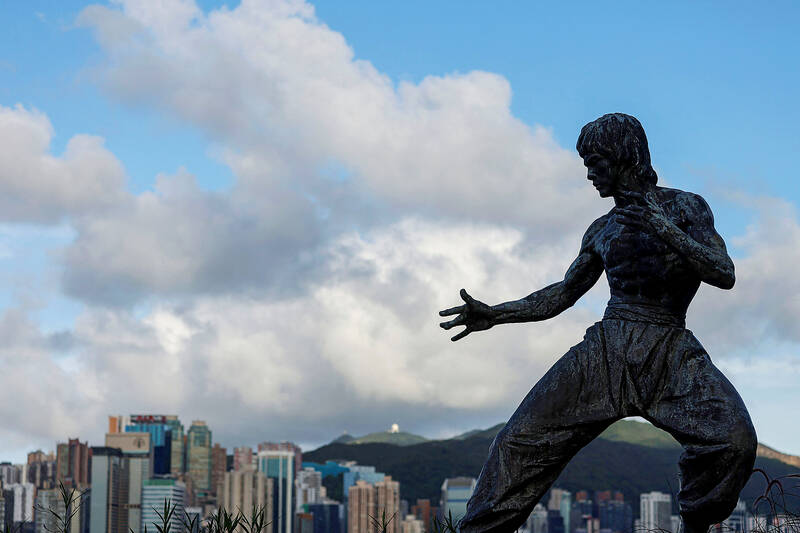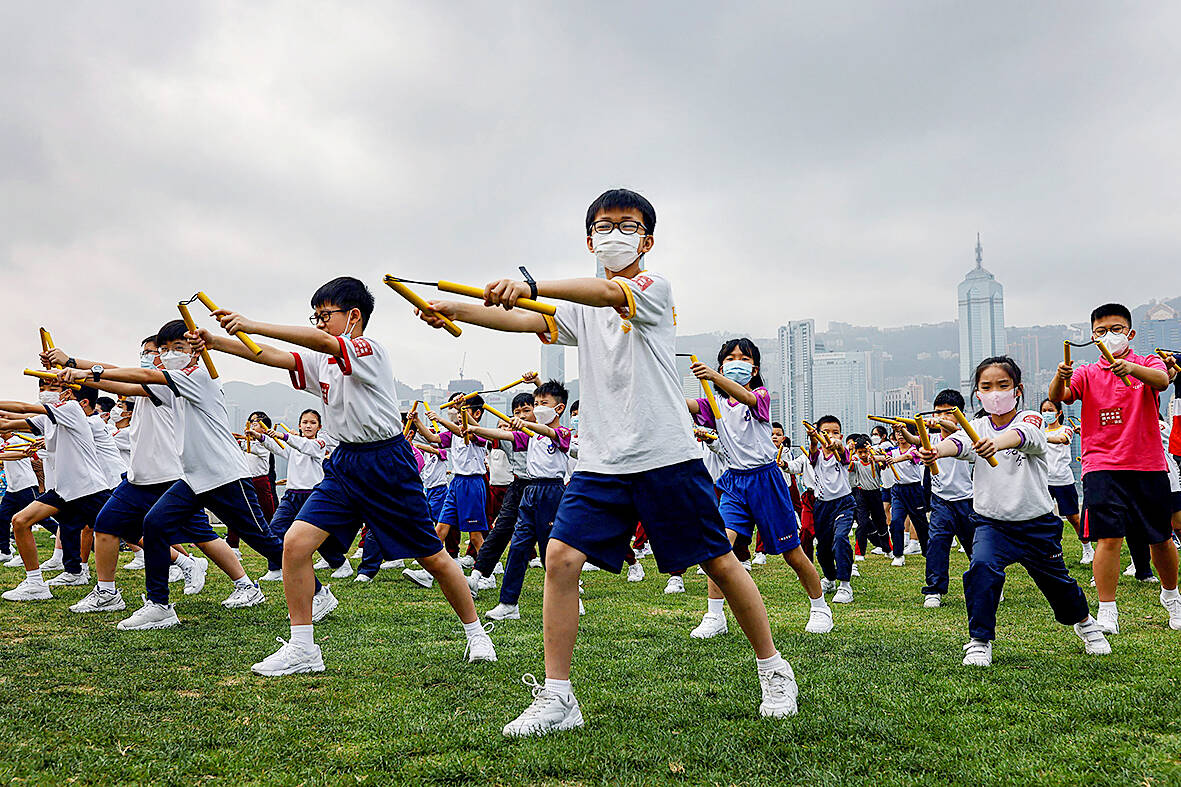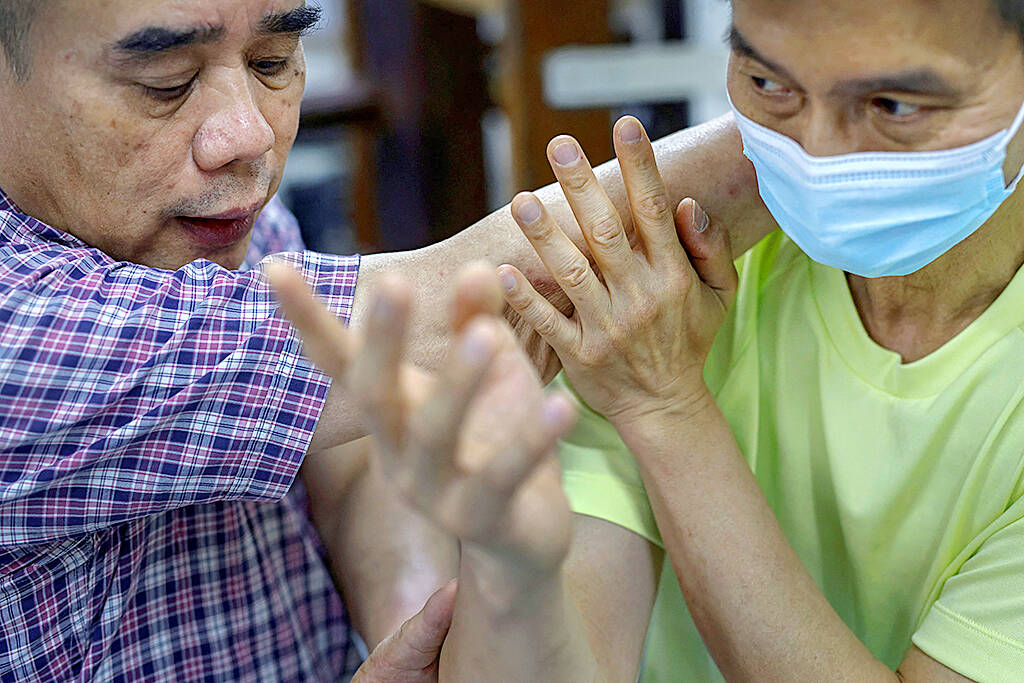Fifty years after the death of Bruce Lee, who galvanized the imaginations of generations of young people worldwide with feats of kung fu immortalized on screen, it sometimes seems as if his legacy of the martial art he practiced is fading in Hong Kong.
Born in San Francisco but brought up in the Asian financial hub which would make him famous, Lee died of brain edema aged 32 on July 20, 1973, just six days before the release of Enter the Dragon, his most popular film.
“He was exceptionally talented and it’s a shame he passed away at such a young age,” said 60-year-old Dorothy Tam, whose hair is now graying, as she punched a sandbag in a small martial arts school covered with bamboo scaffolding in western Kowloon.

Photo: Reuters
Captivated by the skill displayed in Lee’s performance, Tam, who was just 10 at the time, became a lifelong admirer.
But only in 2019 did Tam overcome her initial apprehension about Hong Kong’s male-dominated martial arts scene to start learning Wing Chun, the southern Chinese style of the martial art in which Lee had trained.
“I discovered it’s actually a martial art suitable for women as well, emphasizing softness to overcome hardness,” said Tam, as she stood beside a bronze bust of Lee’s teacher, the late grandmaster Ip Man (葉問).

Photo: Reuters
She began learning with her godson, but her classmates come from all walks of life, some working in information technology and others in business consulting. Most train at night, some still in their office wear.
“Martial arts are not solely about fighting,” Tam added. “My instructor often emphasizes that self-defense is about avoiding conflict and focusing on self-improvement.”
Lee’s contributions to martial arts, film, and philosophy have inspired legions of fans across the world, but the legacy that endured for half a century is sometimes seen as a relic of the past in the former British colony.

Photo: Reuters
‘BE WATER’
On his return from Hollywood in 1971, Lee made four Hong Kong films in just two years, among them Fist of Fury and Way of the Dragon.
He helped popularize kung fu through such blockbuster films and a hit American television series, The Green Hornet, but Wing Chun exponents have struggled to win disciples.
The swift pace of life in one of the world’s most expensive cities often conflicts with the time and effort required to master the traditional martial art, while soaring rents make it tough to set up schools.
“The rent is very expensive, and student tuition fees are not enough to cover that,” said Dennis Lee, chairman of the Ving Tsun Athletic Association, where Tam practices.
“How can you make it your career?”
The association holds classes, social events and arranges annual tomb-sweeping ceremonies for Ip Man, under whom Bruce Lee studied at the age of 13. But of late, attendance at the rituals has been dropping off.
Set up in 1967 by seven Hong Kong disciples of Lee’s influential teacher, the association functions out of a flat bought to serve as its headquarters, staying mostly unchanged for six decades, with original brown tiles still intact.
Dennis Lee, 52, a disciple of the teacher’s son, was also drawn to Wing Chun by the example of the actor, and eventually set up his own school, though it has not been easy.
Kung fu is “an art, and art is lifelong,” added Lee, who runs a logistics firm on the side to supplement his income as he balances the pace of modern life with the dedication required for mastery.
Even so, some enthusiasts, such as Iranian-Australian Nima King, trained by another student of Ip Man, have sought to reshape the teaching style.
The curriculum of his school, opened in 2008, is more modernized to target an international clientele, including children.
“I like kung fu,” said 3-1/2-year-old Sebby Peng, one of a group of pre-schoolers wearing purple and white uniforms who sparred in a brightly-lit studio.
Still, Bruce Lee, who developed his own martial arts form, “Jeet Kune Do,” has not entirely been eclipsed in the Chinese-ruled city.
One of his most famous maxims, “Be water, my friend,” from an interview in 1971, inspired 2019’s pro-democracy movement.
It provided a template for months of wildcat protests citywide against Beijing’s tightening grip of Hong Kong, which returned to Chinese rule in 1997.
Even though he has been dead for 50 years, Lee indirectly influenced King’s career, the instructor said.
“It’s not just about the movies. We respect that spirit. And that’s why we’ve got to work hard to keep preserving it,” he added. “That’s Bruce’s legacy.”

Towering high above Taiwan’s capital city at 508 meters, Taipei 101 dominates the skyline. The earthquake-proof skyscraper of steel and glass has captured the imagination of professional rock climber Alex Honnold for more than a decade. Tomorrow morning, he will climb it in his signature free solo style — without ropes or protective equipment. And Netflix will broadcast it — live. The event’s announcement has drawn both excitement and trepidation, as well as some concerns over the ethical implications of attempting such a high-risk endeavor on live broadcast. Many have questioned Honnold’s desire to continues his free-solo climbs now that he’s a

As Taiwan’s second most populous city, Taichung looms large in the electoral map. Taiwanese political commentators describe it — along with neighboring Changhua County — as Taiwan’s “swing states” (搖擺州), which is a curious direct borrowing from American election terminology. In the early post-Martial Law era, Taichung was referred to as a “desert of democracy” because while the Democratic Progressive Party (DPP) was winning elections in the north and south, Taichung remained staunchly loyal to the Chinese Nationalist Party (KMT). That changed over time, but in both Changhua and Taichung, the DPP still suffers from a “one-term curse,” with the

Jan. 26 to Feb. 1 Nearly 90 years after it was last recorded, the Basay language was taught in a classroom for the first time in September last year. Over the following three months, students learned its sounds along with the customs and folktales of the Ketagalan people, who once spoke it across northern Taiwan. Although each Ketagalan settlement had its own language, Basay functioned as a common trade language. By the late 19th century, it had largely fallen out of daily use as speakers shifted to Hoklo (commonly known as Taiwanese), surviving only in fragments remembered by the elderly. In

William Liu (劉家君) moved to Kaohsiung from Nantou to live with his boyfriend Reg Hong (洪嘉佑). “In Nantou, people do not support gay rights at all and never even talk about it. Living here made me optimistic and made me realize how much I can express myself,” Liu tells the Taipei Times. Hong and his friend Cony Hsieh (謝昀希) are both active in several LGBT groups and organizations in Kaohsiung. They were among the people behind the city’s 16th Pride event in November last year, which gathered over 35,000 people. Along with others, they clearly see Kaohsiung as the nexus of LGBT rights.